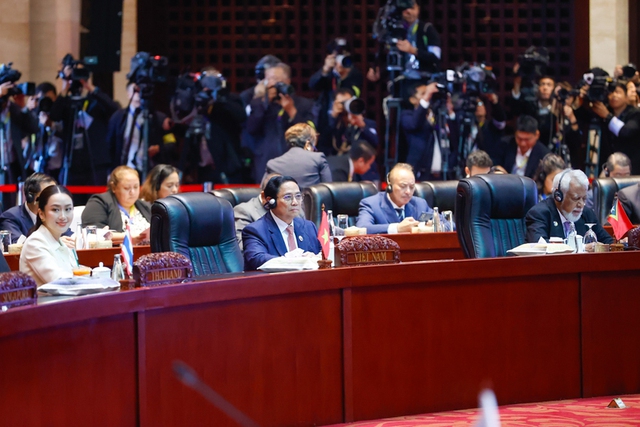Prime Minister urges EAS countries to take lead in tackling global challenges
VGP - Prime Minister Pham Minh Chinh urged East Asia Summit countries to take the lead in tackling global challenges such as aging population, resource depletion, pandemics, climate change, and natural disasters.

Prime Minister Pham Minh Chinh attends the 19th East Asia Summit (EAS), Vientiane, Laos, October 11, 2024 - Photo: VGP
Addressing the 19th East Asia Summit in Laos on October 11, Pham called on the participating countries to increase dialogues, build strategic trust, enhance commonalities, minimize disagreements, respect differences, and work together to address common challenges.
It is important to create an open, inclusive, transparent ASEAN-centered structure that upholds international law for the sake of the people, emphasized the Vietnamese Prime Minister, urging ASEAN's partners to voice their support for ASEAN's centrality with practical actions.
He expected that the EAS countries will play the pioneering role in promoting new growth engines, and prioritize cooperation in sci-tech development, innovation, digital transformation, green transition, circular economy, sharing economy, knowledge economy as well as emerging industries such as artificial intelligence, semiconductor chips, cloud computing, internet of things, and network security.
Pham underscored the importance of maintaining peace, stability, cooperation and harmonious development of interests among relevant parties, and ensuring security and safety of aviation and navigation in the East Sea.
He called on all parties to exercise restraint, minimize disagreements, promote sincere, trustworthy, effective and rules-based cooperation and dialogue, effectively implement the Declaration on the Conduct of Parties in the East Sea (DOC).
Pham suggested creating an environment conducive to the building of a substantive, efficient, effective and legal binding Code of Conduct (COC) in the East Sea in line with the 1982 United Nations Convention on the Law of the Sea (UNCLOS).
The 19th EAS drew the participation of leaders and representatives from the ASEAN member states, Australia, China, India, Japan, New Zealand, South Korea, Russia, and the U.S.
In 2023, trade turnover between ASEAN and the aforesaid countries reaches US$1.7 trillion and foreign direct investment (FDI) flows from these nations into ASEAN reached US$124.6 billion.
At the 19th EAS, participating countries agreed to closely cooperate and effectively implement the EAS Plan of Action for 2024-2028, prioritizing key areas such as climate change response, disaster management, energy transition, resilient supply chains, maritime cooperation, health care, and education.
They underlined the need to leverage new growth drivers like innovation, digital transformation and green economy, and effectively implement free trade agreements, including the Regional Comprehensive Economic Partnership (RCEP)./.
